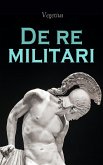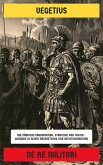In "De re militari," Vegetius offers a comprehensive examination of military strategy and tactics, presenting a detailed guide for Roman military practices that resonates through the ages. Written in a clear and systematic style, the treatise emphasizes the importance of discipline, training, and the moral character of soldiers. Vegetius deftly amalgamates historical examples with poignant insights, reflecting the military climate of late antiquity, when the Roman Empire faced increasing external pressures. His work not only serves as a manual for commanders but also highlights the ideological underpinnings of military strength, linking preparedness with the stability of the state. Publius Flavius Vegetius Renatus, a Roman author typically associated with the late 4th century AD, lived during a time of transformation for the Roman military. His background and experiences within a crumbling empire may have influenced his desire to compile and reformulate military wisdom for both contemporary and future audiences. Vegetius's unique perspective, advocating for a return to discipline and classical virtues amid decline, reflects his concern for the Roman state, embedding his work in the historical context of military reform. "De re militari" is essential reading for historians, military scholars, and anyone interested in the evolution of military thought. Vegetius's insights remain relevant, providing not only a glimpse into the tactical frameworks of Rome but also timeless lessons in leadership and governance. This book will enhance your appreciation of military practices and their historical significance.
Dieser Download kann aus rechtlichen Gründen nur mit Rechnungsadresse in A, B, BG, CY, CZ, D, DK, EW, E, FIN, F, GR, H, IRL, I, LT, L, LR, M, NL, PL, P, R, S, SLO, SK ausgeliefert werden.









